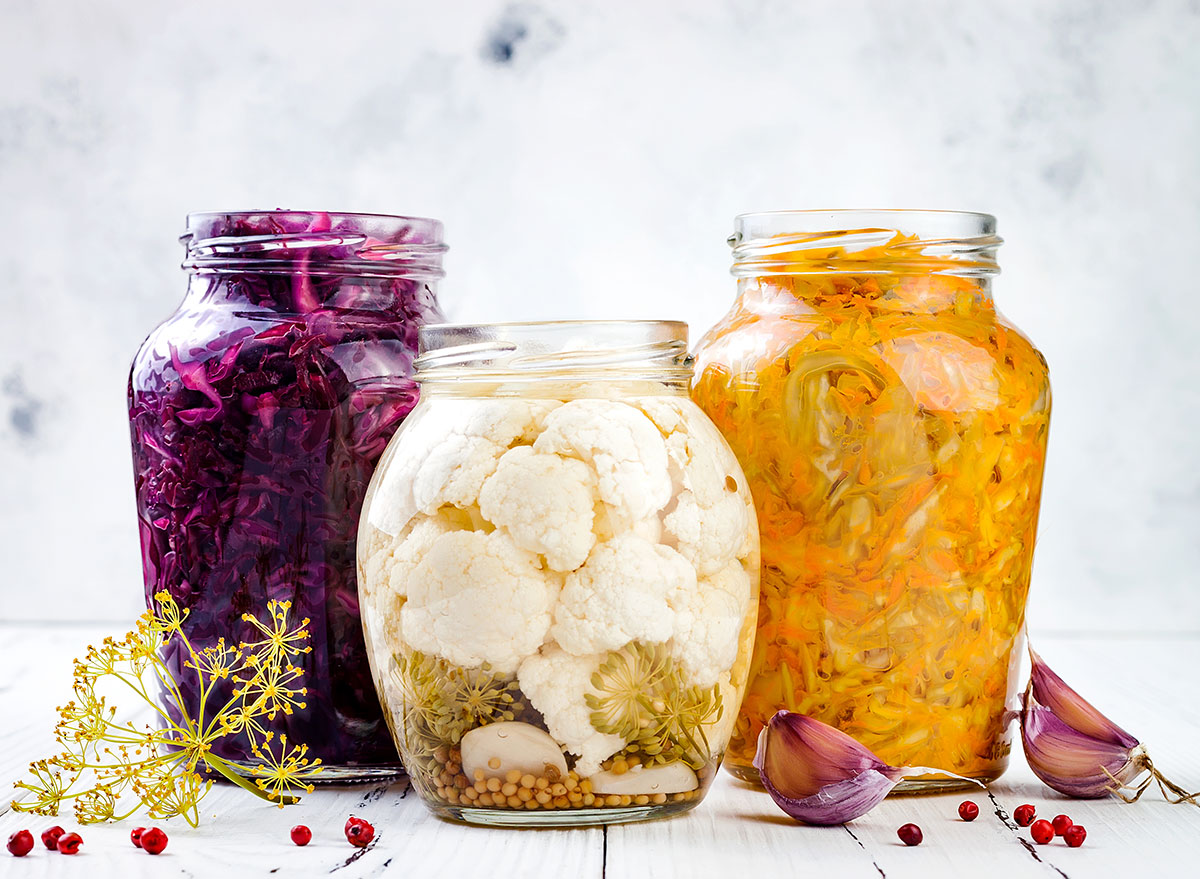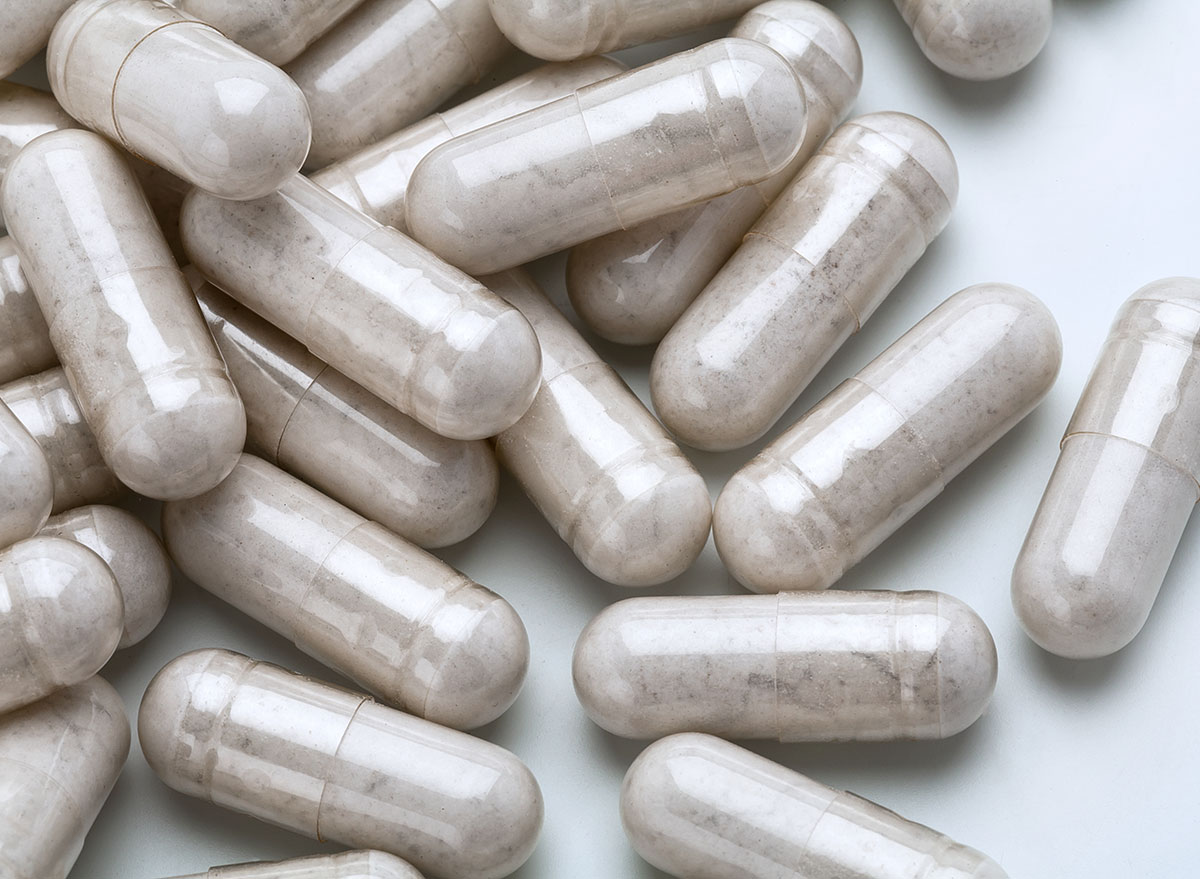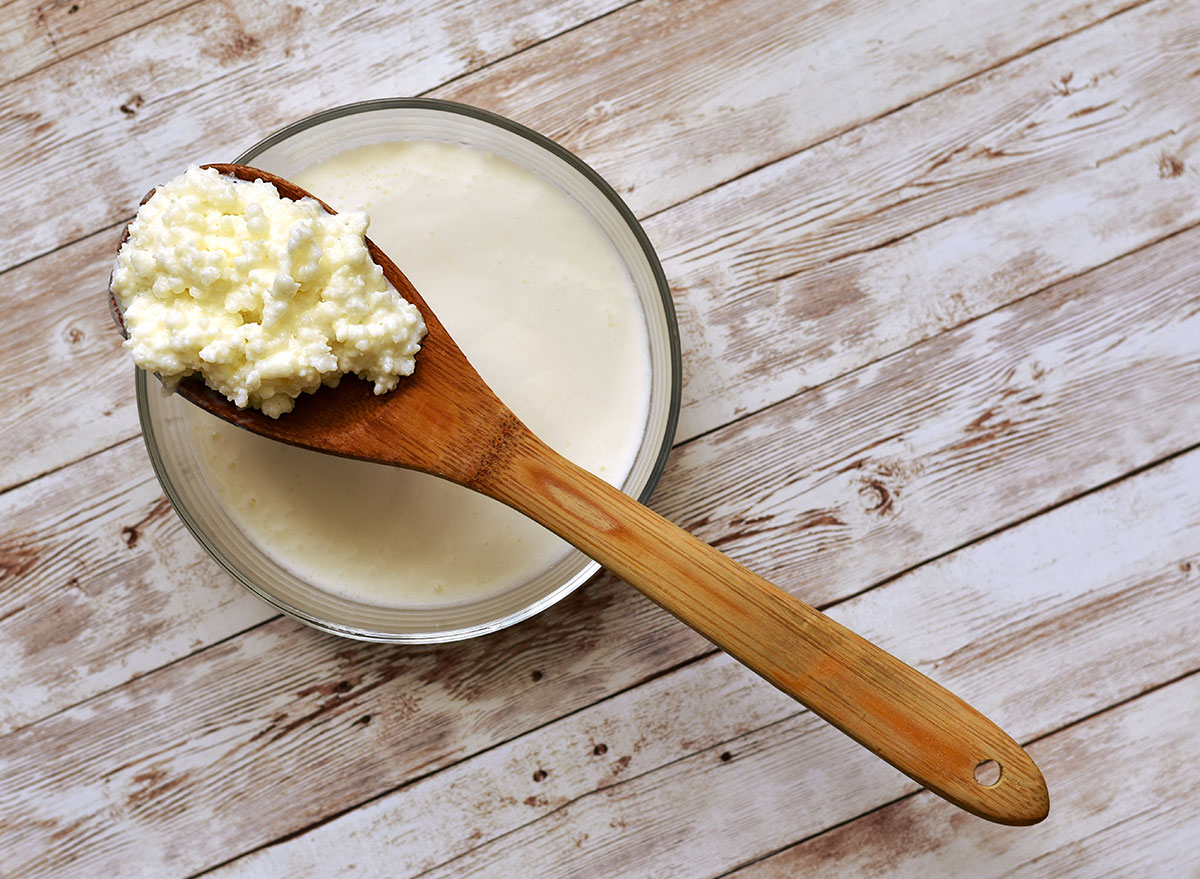What Happens To Your Body When You Eat Fermented Foods

Believe it or not, when you chow down on a meal, you're not the only one eating. Your gastrointestinal system is home to trillions of microbes that help break down food (an average of 60 tons over your lifetime), but the beneficial bacteria among them are picky eaters—and they only flourish if they're fed certain nutrients.
When you consume sugary, processed, and packaged foods, your good gut bacteria don't have the fuel they need to prevent the bad guys from overpopulating, which can wreak havoc and cause digestive issues, illness, and more.
But, when your gut is populated with good bacteria, these microscopic organisms work day in and day out to benefit your health—and you can increase their productivity by eating fermented foods.
What exactly are fermented foods?
"Fermentation has been a staple of the human foodways for centuries and was initially used as a way to preserve foods," explains registered dietitian Maya Feller, MS, RD, CDN of Maya Feller Nutrition. It's a process where natural organisms (like bacteria and yeast) break down sugars and starches in food to create alcohols, gas, or acids. "Fermented foods and beverages are produced through controlled microbial growth and enzymatic action—which gives fermented foods their distinctive tart taste," says Feller.
While yogurt, cheese, and other fermented dairy products may be among the most popular, the list of tasty fermented foods doesn't stop there. Here are 14 fermented foods to fit into your diet—and be sure to avoid these unhealthy options.
One thing to note: there are many benefits to eating fermented foods, but "for people with a sensitive stomach, it's helpful to be mindful of the quantity consumed as there could be some intestinal upset," says Feller, who suggests having one serving a day.
Read on for the bevy of benefits you'll experience when you eat fermented foods.
You can take fewer probiotic pills.

Adding a probiotic into your supplement routine is usually a good idea, but you may be able to get similar benefits from food—or at least augment your supplement intake. "Depending on the fermentation process, fermented foods can be a good source of probiotics, which are known to benefit the gut microbiome and aid in crowding out pathogenic bacteria," says Feller. And no, wine doesn't count!
Your digestion will be enhanced.

The probiotic power of fermented foods helps those beneficial belly bacteria to flourish, which is a boon to your whole digestive system. "These bacteria efficiently break down nutrients that pass through it," explains Feller. And if you're suffering from digestive upset, probiotics are shown to be very effective at managing uncomfortable gastrointestinal symptoms, such as constipation, diarrhea, and irritable bowel syndrome.
Plus, "during the fermentation process, microorganisms break down the food, which makes them automatically easier to digest," says Feller, who offers another surprising benefit: "Some fermented foods, such as cheese and yogurt, can be consumed even by people with lactose intolerance because the bacteria digest the lactose during processing."
Your skin health will get a boost.

As integrative dermatologist Whitney Bowe, MD, explains: "Healthy skin is an inside job." Meaning, what you put inside your body is reflected on the outside thanks to the gut-skin connection. And, says Dr. Bowe, who posts tons of info-packed videos on her TikTok feed, your gut can begin healing within three days when you start eating the right nutrients, including probiotic-rich foods.
Registered nurse Celeste Wilson, RN, BSN, says that the fermentation process can help make nutrients more bioavailable—that is, easier to absorb. "It also synthesizes beauty-boosting nutrients, including vitamin B12, folic acid, and biotin for shiny hair and glowy skin," Wilson notes on her blog, True Spoon.
Inflammation may be lowered.

Fermented foods also help quell inflammation—the root cause of most diseases. In this study, researchers found that drinking kefir (a milky fermented drink) daily reduced inflammation markers of participants after six weeks. (For the best kefir brands to buy, read this.) You don't have to down kefir every day to get the benefits—try adding it to smoothies or stirring it into overnight oats.
Active compounds in tempeh (fermented soybeans) may help fight free radicals, which can cause cellular damage and increase inflammation throughout the body. Not sure how to prepare tempeh? We've got you covered—here are 15 game-changing tempeh recipes.
Your heart can get healthier.

"Fermented foods can have a beneficial impact on lipid profiles," explains Feller. "They are involved in short-chain fatty acid production, which has a cholesterol-lowering effect." Plus, probiotics in general have been linked to improved blood pressure.
Sauerkraut has high levels of vitamin K—which, if you're not getting enough of, could cause blood vessels to harden.
Tempeh has been shown to lower levels of LDL cholesterol (the bad kind) and so has kombucha.
Ready to pop some probiotic-filled bubbly? (No, not champagne…) Here are the 11 best low-sugar kombucha brands to buy.
Your blood sugar levels will be more balanced.

Once again, it all comes back to a healthy gut. Probiotics have been linked with improving blood sugar, so fermented foods rich in probiotics can help reduce insulin resistance and may even help manage or even prevent diabetes. In this study, kimchi (spicy fermented veggies) reduced insulin resistance, blood pressure, and body weight in prediabetic participants after 8 weeks.
You can lose excess weight.

A systematic review of multiple studies in 2015 found a strong correlation between eating yogurt and "lower or improved body weight," which may be in part due to the high content of probiotics. Just be sure to eat yogurts with active cultures and no added sugar.
You'll absorb nutrients more easily.

"Fermentation also helps to break down and destroy antinutrients (such as phytic acid), which have the potential to reduce the absorption of zinc, calcium, and iron," says Feller.
You may be able to think more clearly.

Due to the gut-brain axis, your gut is in constant communication with your brain, so in other words: "Gut inflammation is brain inflammation," Dr. Naidoo, MD, a Harvard-trained nutritional psychiatrist and author of This Is Your Brain on Food, has told Eat This, Not That!. Continued research points to probiotics' healthy effect on your gut microbiome and brain function, so adding fermented foods to your diet can support healthy brain function.
Your mood could get a lift.

"Many neurotransmitters are produced in the gut (including dopamine, serotonin, and norepinephrine), which all play a role in mental health," says Feller, adding: "Fermented foods contribute to this effect by providing beneficial bacteria to populate the gut microbiota."
Feeling stressed? Here are the 9 worst foods to avoid.








